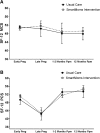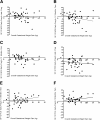Mood and quality of life changes in pregnancy and postpartum and the effect of a behavioral intervention targeting excess gestational weight gain in women with overweight and obesity: a parallel-arm randomized controlled pilot trial
- PMID: 30696408
- PMCID: PMC6352352
- DOI: 10.1186/s12884-019-2196-8
Mood and quality of life changes in pregnancy and postpartum and the effect of a behavioral intervention targeting excess gestational weight gain in women with overweight and obesity: a parallel-arm randomized controlled pilot trial
Abstract
Background: Intensive lifestyle interventions in pregnancy have shown success in limiting gestational weight gain, but the effects on mood and quality of life in pregnancy and postpartum are less known. The purpose was to quantify changes in mental and physical quality of life and depressive symptoms across pregnancy and the postpartum period, to determine the association between gestational weight gain and change in mood and quality of life, and to assess the effect of a behavioral intervention targeting excess gestational weight gain on these outcomes.
Methods: A three group parallel-arm randomized controlled pilot trial of 54 pregnant women who were overweight or obese was conducted to test whether the SmartMoms® intervention decreased the proportion of women with excess gestational weight gain. Individuals randomized to Usual Care (n = 17) did not receive any weight management services from interventionists. Individuals randomized to the SmartMoms® intervention (n = 37) were provided with behavioral weight management counseling by interventionists either in clinic (In-Person, n = 18) or remotely through a smartphone application (Phone, n = 19). In a subset of 43 women, mood and mental and physical quality of life were assessed with the Beck Depression Inventory-II and the Rand 12-Item short form, respectively, in early pregnancy, late pregnancy, 1-2 months postpartum, and 12 months postpartum.
Results: The SmartMoms® intervention and Usual Care groups had higher depressive symptoms (p < 0.03 for SmartMoms® intervention, p < 0.01 for Usual Care) and decreased physical health (p < 0.01) from early to late pregnancy. Both groups returned to early pregnancy mood and physical quality of life postpartum. Mental health did not change from early to late pregnancy (p = 0.8), from early pregnancy to 1-2 months (p = 0.5), or from early pregnancy to 12 months postpartum (p = 0.9), respectively. There were no significant intervention effects. Higher gestational weight gain was associated with worsened mood and lower physical quality of life across pregnancy.
Conclusion: High depressive symptoms and poor quality of life may be interrelated with the incidence of excess gestational weight gain. The behavioral gestational weight gain intervention did not significantly impact these outcomes, but mood and quality of life should be considered within future interventions and clinical practice to effectively limit excess gestational weight gain.
Trial registration: NCT01610752 , Expecting Success, Registered 31 May 2012.
Keywords: Gestational weight gain; Mental health; Pregnancy; Quality of life.
Conflict of interest statement
Ethics approval and consent to participate
The study was approved by the Pennington Biomedical Research Center and Woman’s Hospital Institutional Review Boards, and written informed consent was obtained for by all participants prior to the initiation of procedures.
Consent for publication
No individual patient data is included in this manuscript.
Competing interests
SmartMoms® is a registered trademark of the Louisiana State University System, with the trademarked approach having been developed by Drs. Redman and Martin. There are no direct benefits to the authors for publication of this manuscript. Drs. Redman and Martin have no financial affiliations with the companies who conducted the work to develop the SmartMoms® Virtual Weight Management Suite. Any licensing of SmartMoms® could financially benefit LSU-Pennington Biomedical Research Center, Montclair State University, and Drs. Redman and Martin. All other authors did not report any potential competing interests.
Publisher’s Note
Springer Nature remains neutral with regard to jurisdictional claims in published maps and institutional affiliations.
Figures




References
-
- Institute of Medicine NRC . Weight gain during pregnancy: reexamining the guidelines. Washington, DC: The National Academies Press; 2009. - PubMed
Publication types
MeSH terms
Associated data
Grants and funding
- 1 U54 GM104940/National Institute of General Medical Sciences
- U01 DK094466/DK/NIDDK NIH HHS/United States
- P30 DK072476/National Institute of Diabetes and Digestive and Kidney Diseases
- U01 DK094418/National Institute of Diabetes and Digestive and Kidney Diseases
- U01 DK094463/National Institute of Diabetes and Digestive and Kidney Diseases
- P30 DK072476/DK/NIDDK NIH HHS/United States
- U01 DK094416/National Institute of Diabetes and Digestive and Kidney Diseases
- U54 GM104940/GM/NIGMS NIH HHS/United States
- U01 DK094418/DK/NIDDK NIH HHS/United States
- U01 HL114377/HL/NHLBI NIH HHS/United States
- U01 DK094416/DK/NIDDK NIH HHS/United States
- U01 HL114377/National Heart, Lung, and Blood Institute
- U01 DK094463/DK/NIDDK NIH HHS/United States
- U01 HD072834/HD/NICHD NIH HHS/United States
- 5U01 DK094466/National Institute of Diabetes and Digestive and Kidney Diseases
- U01 HL114344/National Heart, Lung, and Blood Institute
- U01 HD072834/National Institute of Child Health and Human Development
- U01 HL114344/HL/NHLBI NIH HHS/United States
LinkOut - more resources
Full Text Sources
Medical

